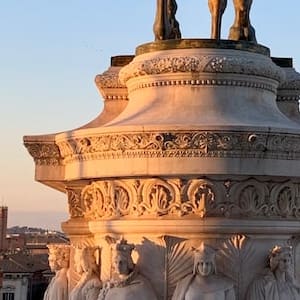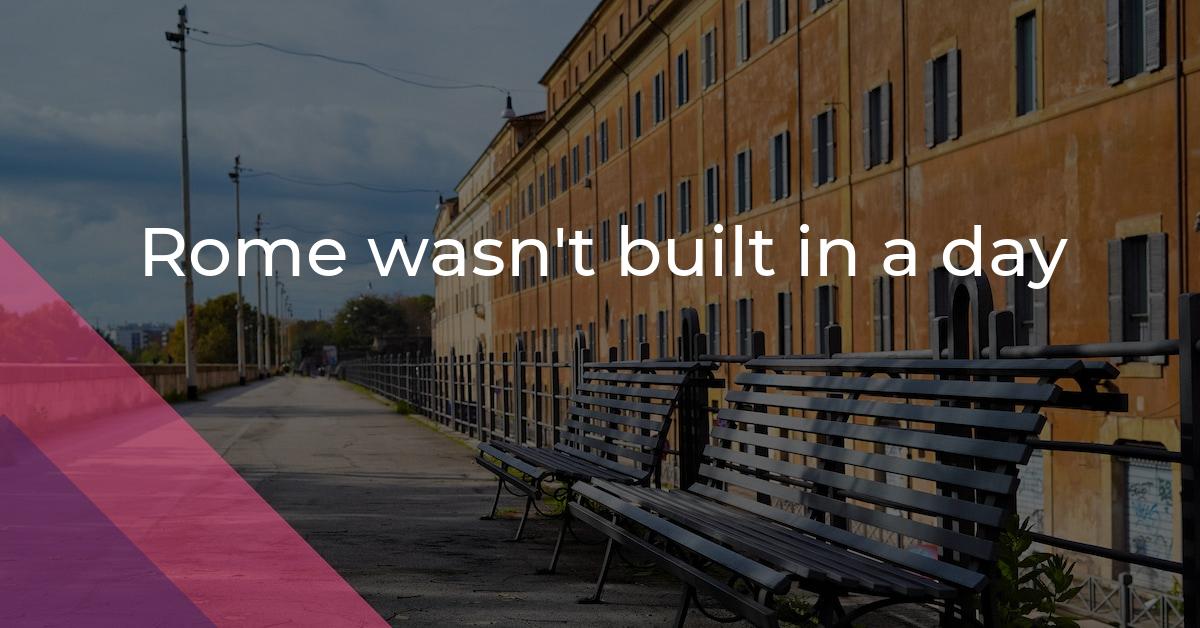Rome wasn’t built in a day: Idiom Meaning and Origin
What does ‘Rome wasn't built in a day’ mean?
The idiom Rome wasn't built in a day means that achieving something great takes time and effort, and cannot be done quickly. It emphasizes the importance of patience and gradual progress in achieving a goal.

Idiom Explorer
The idiom "race against time" means to hurry or work quickly to complete a task or reach a goal before a deadline or before it becomes too late.
The idiom "put one's pants on one leg at a time" means that someone is just an ordinary person, emphasizing equality and normalcy.
The idiom *plow the sands* means to waste time or effort on a pointless task or pursue a goal that is impossible to achieve, due to the futility of plowing sand. It implies a lack of productivity and provides a visual comparison to emphasize the futility.
The idiom "on the way" means that something is currently in progress or about to happen. It suggests that something is not yet completed or arrived, but is in the process of getting there.
The idiom "one step at a time" means to proceed or approach a task slowly and methodically, focusing on each individual stage or action before moving on to the next.
The idiom "now or never" means that something must be done immediately or it will never be possible to do it. It emphasizes the urgency of taking action without delay.
The idiom "not quite" means to not fully reach or achieve something, indicating a slight difference or falling just short of a particular expectation or goal.
The idiom "no time" is used to express a lack of available time or the urgency of completing a task or action quickly.
The idiom "nothing ventured, nothing gained" means that if you don't take risks or try new things, you will not achieve anything or make any progress.
Millennial Marvel: Slow and Steady Builds Rome
One of the most well-known idioms in the English language is the phrase "Rome wasn't built in a day." This idiom highlights the importance of patience, persistence, and dedication when working towards a goal. It reminds us that complex tasks or great achievements take time and cannot be rushed.
The phrase "build up" is a related idiom that ties into the concept of Rome not being built in a day. When we say that something is "building up," we mean that it is progressing or developing gradually over time. This idea aligns with the notion that Rome's greatness was not achieved hastily, but through years of labor, careful planning, and collective efforts.
The idiom "go nowhere fast" is another related phrase that can be connected to the concept of Rome not being built in a day. When we say that something is "going nowhere fast," we mean that it is making little or no progress. This idiom serves as a caution against impatience and unrealistic expectations. It reminds us that true accomplishments require time, dedication, and a step-by-step approach.
The origin of the idiom "Rome wasn't built in a day" can be traced back to ancient Rome. Historical evidence suggests that the phrase was first recorded in the 12th century, although it likely existed in oral form long before that. The idiom is often attributed to the French cleric and chronicler Alain de Lille, who wrote a Latin version of the phrase in his work "De Planctu Naturae" (The Complaint of Nature).
Over the centuries, the idiom gained popularity as Rome became a symbol of grandeur and architectural prowess. It reminds us that even the mighty city of Rome, with all its magnificent structures and infrastructure, was not erected overnight. It took years of labor, meticulous planning, and collective efforts to transform Rome into the remarkable city it became.
The idiom "Rome wasn't built in a day" encapsulates a timeless truth. It suggests that truly remarkable achievements require time and effort. Just as Rome's greatness was not achieved hastily, significant accomplishments in our own lives or in society as a whole cannot be expected to materialize in a short span of time.
When we think about the related idiom "build up," we can see how it ties into the concept of Rome not being built in a day. Achieving something great often involves a gradual process of growth and development. Just as Rome was built up over time, so too must our own goals and aspirations be built up through consistent effort and progress.
Similarly, the idiom "go nowhere fast" can be connected to the idea of Rome not being built in a day. If we try to rush the process or take shortcuts, we may find that we are going nowhere fast. True progress requires patience and a willingness to take the time necessary to build something meaningful.
There are different interpretations of the idiom "Rome wasn't built in a day," but they all revolve around the notion of patience and perseverance. One interpretation could be that the idiom emphasizes the need for sustainable, long-term investments in order to achieve success. It encourages individuals and organizations to avoid shortcuts and instead focus on steady progress.
Another interpretation is that the idiom underscores the value of endurance and resilience when faced with challenges. It reminds us that setbacks and obstacles are inevitable, but they should not deter us from pursuing our goals. Just as Rome faced numerous setbacks, including wars, invasions, and economic struggles, the idiom suggests that setbacks are a natural part of any journey towards success.
The idiom also serves as a reminder to celebrate small victories along the way. Rome's greatness was not achieved in a single day, but through a series of small steps and achievements. It encourages us to recognize the progress we are making, even if it may seem slow at times.
Furthermore, the idiom acts as a caution against impatience and unrealistic expectations. It reminds us that great accomplishments require time, dedication, and a step-by-step approach. We should not expect to achieve overnight success, but rather embrace the journey and the lessons we learn along the way.
The idiom "Rome wasn't built in a day" has become a part of everyday language and is often used to offer words of encouragement or to temper someone's impatience. It serves as a gentle reminder that the road to success is rarely quick or easy. While some might interpret the idiom as discouraging, it ultimately emphasizes the virtue of perseverance and the rewards that come with long-term effort.
As we navigate through life's challenges, the wisdom embedded in this idiom can serve as a beacon of hope. It reminds us that even the most formidable achievements are made possible through patience, endurance, and unwavering commitment. Just as Rome was not built in a day, our own dreams and aspirations may take time to materialize. But with dedication and perseverance, we can build something great that stands the test of time.
Example usage
The idiom "Rome wasn't built in a day" can be used in several different contexts:
1. When someone is impatient for success, you can say "Remember, Rome wasn't built in a day" to remind them that achieving their goals takes time and patience.
2. If someone is expecting instant results or a quick fix to a problem, you can use this idiom to imply that good things take time and cannot be accomplished overnight.
3. This idiom can also be used to emphasize the importance of being persistent and not giving up easily, as building something great requires consistent effort and perseverance.
More "Proverbs" idioms



